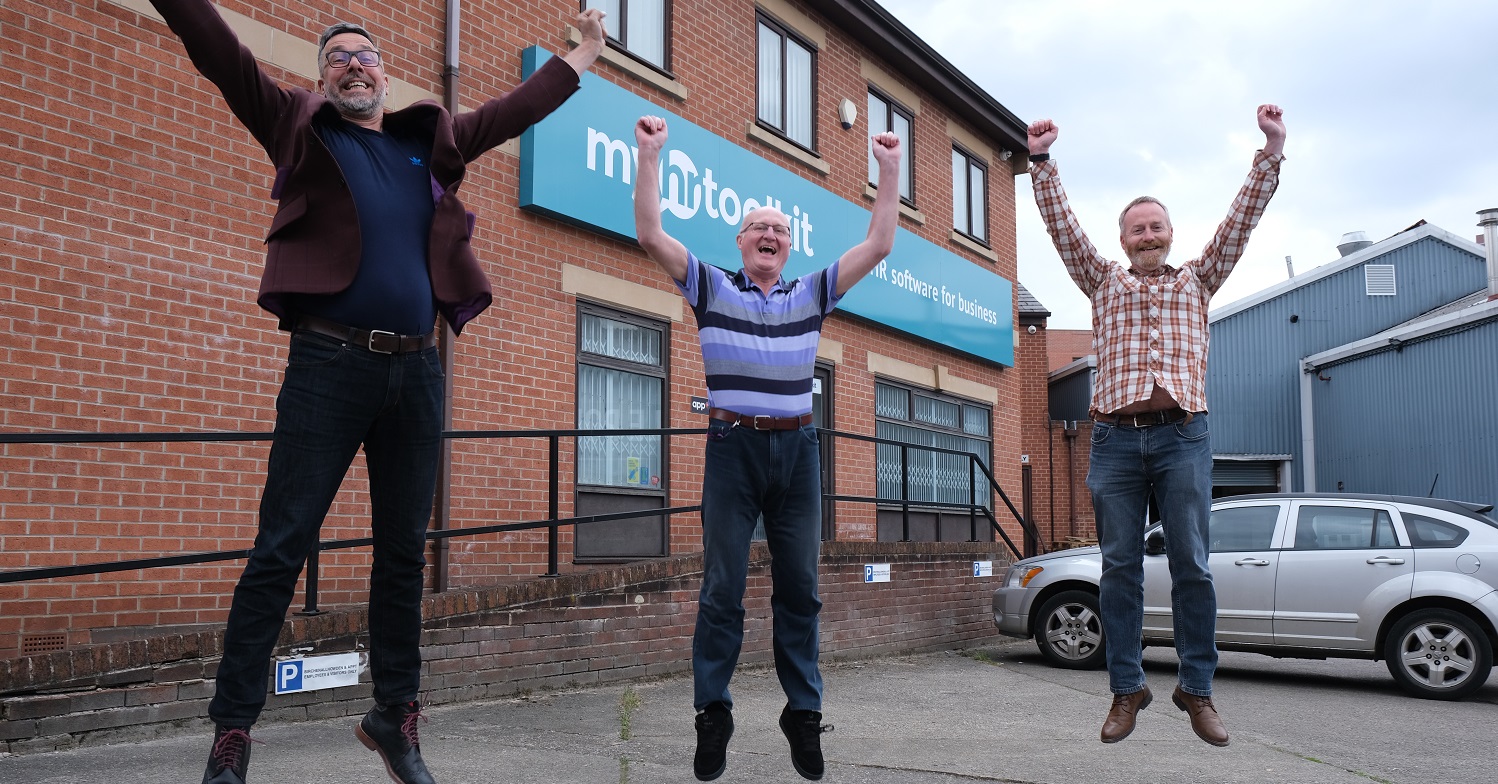Get to know myhrtoolkit's new Managing Director!
Our Senior Marketing Executive, Camille Brouard, sat down with our new Managing Director, Bob Teasdale to ask him about all the exciting changes at myhrtoolkit and his new role.
Read to learn more about how the HR software market has changed in the last 8 years, how Bob adjusted from working in one of the biggest recruitment corporates in the world to a start-up business, and myhrtoolkit's recent exciting acquisition by the Agilio Group!
The header image is of myhrtoolkit Founder Jon Curtis, Managing Director Bob Teasdale, and Technical Director Kit Barker. You can also listen to the interview as a podcast.
So Bob, what has your journey with myhrtoolkit been like for the 8 years you’ve been with the company?
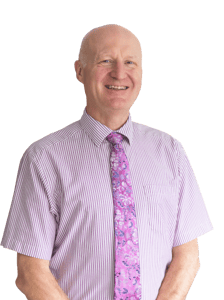 "When I started with myhrtoolkit, I was the first full time member of staff; there was me and two part timers. So straightened were our times that the two part timers had to coordinate their rota because they only had one desk chair and computer between them! Me joining was a big step forward – I had my own desk, my own chair, and my own computer.
"When I started with myhrtoolkit, I was the first full time member of staff; there was me and two part timers. So straightened were our times that the two part timers had to coordinate their rota because they only had one desk chair and computer between them! Me joining was a big step forward – I had my own desk, my own chair, and my own computer.
"So that’s where we started. I think at that time we had about 90 customers – I always regret not measuring it more accurately at the time – and we just started adding them and it’s old but it’s golden, but we added them one at a time. Then, when we could afford it – we were pretty much entirely self-funding – we hired more people. I think the next person we acquired was someone to do the support, so we had a dedicated person to help the customers get the most out the software and when we had the odd bug along the way they took a report."
"Along the way the software’s got more detailed, more complex, it offers more functionality. We spend a lot of time listening to customer feedback and factoring that in."
"Everything else was done externally with freelancers and when we got to about 5 people or so we made the momentous decision to move out of this really little, tiny office – it wasn’t really much bigger than a garden shed – and we moved downstairs, where there was an entirely abandoned amount of office space. We moved into that, again into one office – we thought we’d made it!
"Then we hired more people; we started to hire more coders at this stage and we brought the coding entirely inhouse. Then we got more rooms, more people, more rooms, more people. We ended up with around 20 people and we occupied this entire floor.
"Along the way the software’s got more detailed, more complex, it offers more functionality. We spend a lot of time listening to customer feedback and factoring that in. You can’t please all the people all the time, but we always spent a lot of time trying to give them the most bang for their customer buck, if you like.
"So that brings us up to date really, that’s where we are now in terms of number of people. We’ve gone from those 90 customers to now having over 1,200 and the business went from being fledgling into well-established."
CB: It’s been quite a journey over that time! I’ve been with the company for two and a half years now, but definitely in the time I’ve been here it’s grown a lot and really kept momentum.
"What changes as well is your outlook. When I started, we were entirely a sales business. It was almost as if somebody else did what we told them – somebody else developed this product that we then sold, it was almost like a black box. Whereas, since that time, we’ve moved to having a sales and marketing operation and having a software development operation.
"So the culture, the ethos, how we see ourselves, the type of company we are has changed over that time. There was almost a moment 4 years ago, something like that, where we said all of a sudden: 'Ooh look, we’re a software company!' Whereas before the focus had been on sales, which you often need to do in a small business to get it off the floor. A lot of companies spend a lot of time developing amazing software, but run out of money because they haven’t got around to selling it yet. We sort of did it the other way round in a way. But yeah, it’s evolved over time."
What have been some of your biggest learnings over the past 8 years?
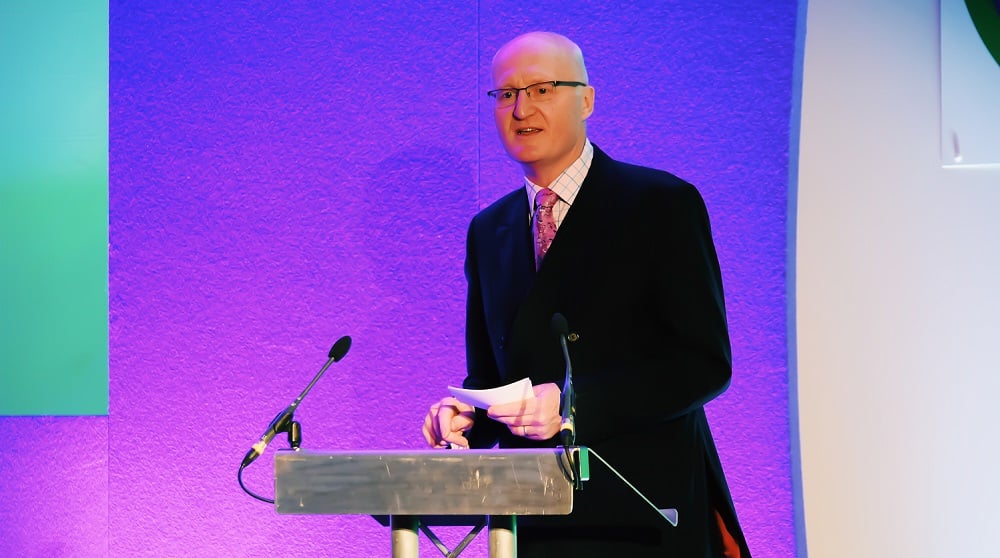
Bob presenting at software partner The HR Dept's awards show for licensees
"I think in the early years, we were very responsive to customer need. We really wanted that feedback because every customer counted. I think we probably should have been a little more confident of selling the product we had. We spent ages – not just me, but the whole team – every time a suggestion was made, we would dissect it, we would think of great solutions and, in all honesty, we’d do that until the next great idea came along and we’d think about that.
"Some years in, my mantra started – for the Sales team – we’re not stopping developing the product, but at any moment in time we need to sell people the product we’ve got. I’ve driven that in, that we’re scrupulously honest with people, we always say, 'this is what it does, this is what it doesn’t do. It’s only ever going to get better, but today this is the product'."
CB: Yeah, it’s better to be honest with people, isn’t it? Set their expectations in what the software is and what it’s going to be…
"Yeah! Because our product is licensed monthly, a very short notice period. The product stands for itself, we don’t try and tie people in, in any way. If we were trying to overegg the pudding at the start, people are going to look at it, we’re going to put a lot of time and effort into helping them get started, and then they say, 'well it doesn’t do these things you claimed' and then they’ll leave. That’s no way to build a business.
"I think for me personally, something that I’ve learned along the way: I came from a background in recruitment – I know, I’m trying to put it behind me! But in recruitment, no matter what level of seniority you are, there’s huge amounts of supervision. You’re not really left to get on with it yourself very much and that’s almost at manager, regional manager, director level."
"The product stands for itself, we don’t try and tie people in, in any way. If we were trying to overegg the pudding at the start [...] that’s no way to build a business."
"That took a while to shake off; I have this tendency to want to know what’s going on and be able to measure it. They’re valid points but I think, as a business, we evolved over time. Now, we’re more comfortable letting people do their own thing, giving people the task and letting them find the way to do it themselves."
CB: It’s developing that trust, isn’t it? That people will bring their best and that, if you have that trust in people, then they will think 'okay, they’re supporting me in what I’m doing'.
"Yes, the way I look at it, it’s about inputs and outputs. So you can measure people on the inputs –how many tweets have you made today or how many sales calls have you made today? It’s all inputs, it tells you nothing. But it also requires a maturity in the employer as well to measure people on outputs – how many leads have we generated? How many sales have we achieved?
"You have to bring people on the journey, because people from certain backgrounds just aren’t used to that, so we learned that along the way."
Learn more: How to develop a performance management plan for your small business
What drew you to the HR software market and myhrtoolkit in particular?
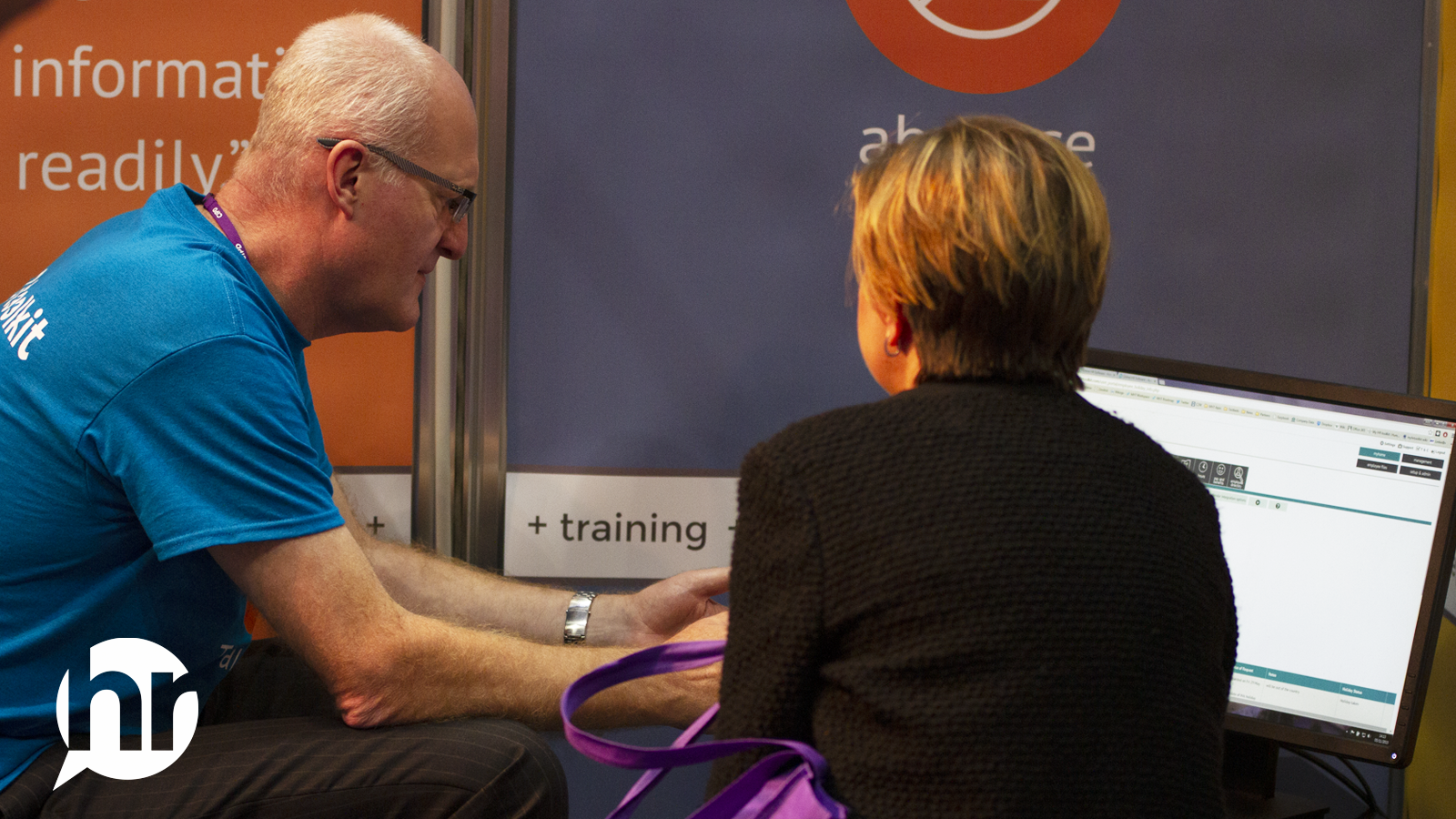
Bob demonstrating myhrtoolkit at a CIPD exhibition
"In part, it was a job! I’d worked in recruitment, I’d been made redundant as a consequence of the 2008 credit crunch, and I spent a bit of time resting between jobs, as actors love to call it – and I genuinely did, it was great. Unfortunately, I couldn’t afford to do it indefinitely.
"So, a friend of mine rang me up and basically said, 'are you still slacking off sat at home, Teasdale?'
"I said, 'well, yeah'.
"And he said, 'well, do you want a job?'
"So I said, 'well… yeah!'
"And he said, 'ring this bloke up'.
"So I rang Jon Curtis, who was the founder of the business, and he said, 'come on down Friday and we’ll have a chat'. I went down and it turned out Jon’s then business partner knew me, so it was quite a warm interview.
"When I was in recruitment I was working for Adecco, it was a huge corporate. In the interview they asked me, 'how do you think you’ll cope without the corporate environment?' and having done it for 17 years, I was like, 'I think I’ll like that a lot!' And that sort of drew me to it."
"I signed up pretty much then and there, I was committed."
"The recruitment I had done had been technical, so IT, programmers and managers and that sort of thing, so I was comfortable with the idea of a software company. It looked fun, it was new, and they said, “We’re going places. We’re going to really get going and we need somebody to lead this”. I signed up pretty much then and there, I was committed."
CB: Sometimes it’s not always what you’re expecting to go into... but you can find things that really work and that you can sink your teeth into, right?
"It was kind of like a blank canvas. In the early days, projects were very small, but you could think of a good idea in the morning and by that evening you were doing it. Because there was no structure, because it was all fledgling, you could do anything you wanted. Whereas now, with projects we have to plan them, they’re structured, they’re all captured, we use software to run them – because if you change one thing, there’s a risk that 15 other things will be impacted."
How would you say the HR software market has changed since you started in this sphere?
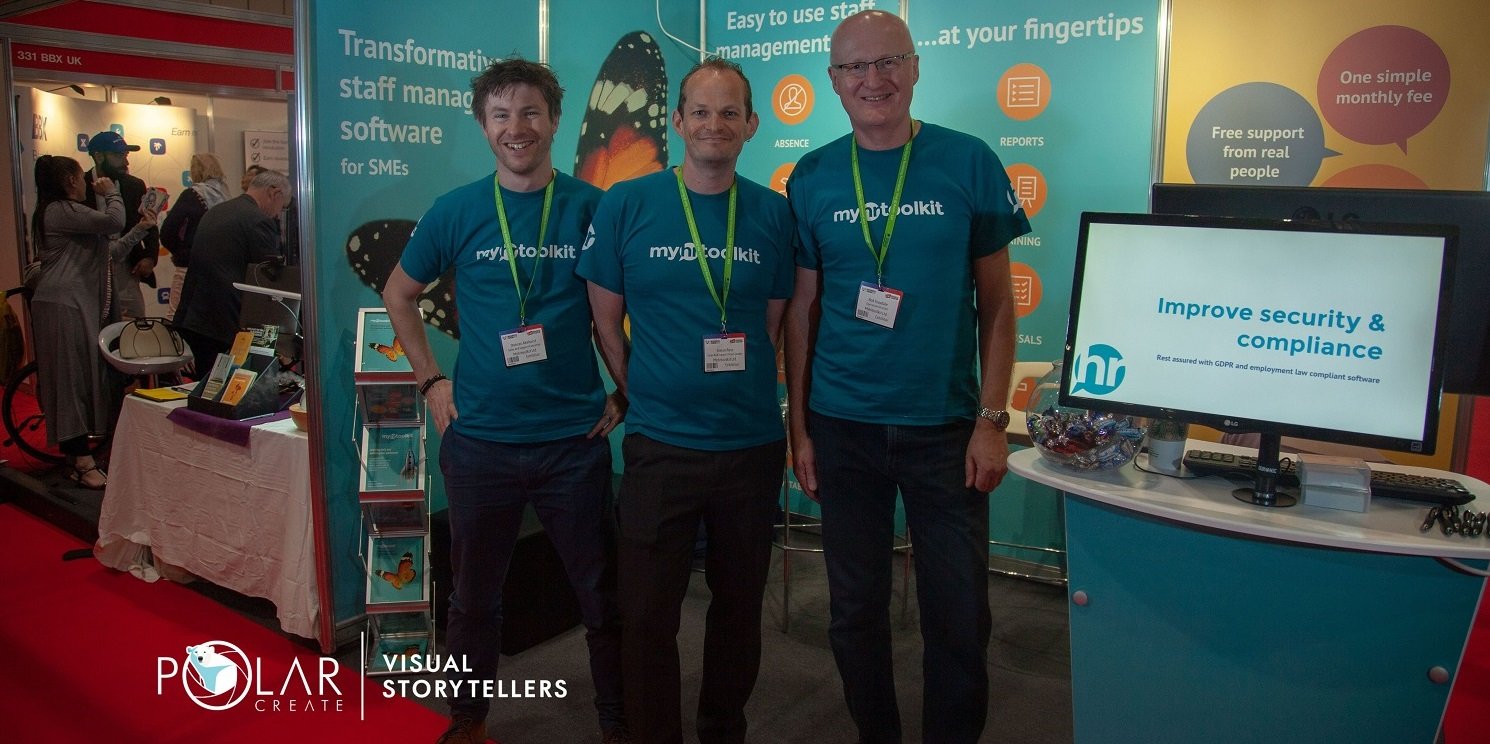
Showcasing myhrtoolkit at The Business Show in 2019
"I think the main thing that’s changed in the time I’ve been involved, certainly – the customer has become much more sophisticated. The thing that tells me this is that, pre-pandemic, we’d go to shows a lot. We’d meet our customers and meet potential customers. In the early days, we’d show the software to somebody and say, 'look, it’ll calculate someone’s holiday entitlement accurately'."
"People thought they were looking at magic – 'woaaah!' – and some would buy it then and there! They were amazed. Whereas now, when we attend shows – or back in 2019, when we were last attending shows – people come and they say 'do you do this, that, and the other? Do you provide Multifactor Authentication? Do you have ISO 27001 provenance?'"
"Customer sophistication has grown considerably."
"They’re just so much more informed. They’re reviewing the market, they know there’s great choice, and that choice is moving down the scale. Even if you’ve got 10 employees or less, there’s great choice in what you want, and it’s all competitively priced.
"Over time, we’ve upskilled and as we’ve acquired more salespeople and support people, we’ve factored that in, so we have much more technically astute people who understand not just what the software is doing but understand what the HR is all about as well, so they can marry the two together – they know what the customer is trying to achieve. So yeah, customer sophistication has grown considerably.
"The other big change that, trend-wise, has been and gone: for a while it looked like that the way software – almost in general, but certainly HR software – would go, everybody would move to a unified system.
"In our case, the myhrtoolkit system would do payroll, would do recruitment, would have rotas - in addition to the holidays, sickness, training, and all that, but everything would come in one package. For a while – It’s not an easy thing – but we were edging towards that and I know all our competitors were edging towards that, so you owned that space."
"I think we’re in the middle of a move towards people wanting to be able to blend systems together. They want systems to talk to each other, such that they can create their own environments."
"Some years ago, that started to decline and certainly in the SME space it’s not a realistic proposition. People have found that customers want best of breed, they don’t want our version of this, this, this, and this. They want to use customer X’s payroll software and customer Y’s recruitment software.
"I think we’re in the middle of a move towards people wanting to be able to blend systems together. They want systems to talk to each other, such that they can create their own environments. Because a lot of these systems, like myhrtoolkit, are easy on, easy off – there’s monthly license fees, there’s negligible notice – it keeps providers on their toes. You might be the payroll system de jour, but next week you might find somebody’s invented something slightly different and you’ve been cancelled and they’ll be bolting theirs in.
"I don’t pretend to understand the detail of it, but all of this is driven by the idea of API connection. Different systems will talk to each other; the idea that they’re fully hardcode integrated is no longer valid. It’s the API microservices that are driving that and joining it together."
What do you think will be your biggest challenge as Managing Director and what are you most excited about?
"I think one of the biggest changes for me – I’ve never occupied the Managing Director role before – I’ve always been very orientated around sales and marketing. So, it’s going to be about letting go of some of the detail around the sales and marketing.
"I can practice what I preached about, earlier in the interview – trusting people to get on with it, that’s working well, hats off to everybody, the wheels are on. It’s about me understanding and becoming part of the development side of the business as well. We have a very capable Director [Kit Barker] running that, but it’s important that I’m there to back him up in doing so."
"Keep an eye on what’s going on, take the inputs, make sure we’re going in the right direction, and make sure that everybody’s working well together. That and buy beer at Christmas."
"It’ll be, for me, about letting go of some of the things I used to do that used to be critically important in my old role and focusing on the things that the business as a whole needs me to be doing going forward. It’s shifting your mentality, blending the different parts of the business together, rather than just running and leading the sales and marketing sides of things."
CB: So basically, are you now the API of myhrtoolkit’s different departments? (The word ‘blending’ reminded me!)
"Yes, I suppose in a way! I can’t do all of those jobs and we have loads of people, most people in our business, who do jobs that I don’t know how to do. I think a phrase that I’ve read before is 'integrator' – so, keep an eye on what’s going on, take the inputs, make sure we’re going in the right direction, and make sure that everybody’s working well together. That and buy beer at Christmas.
"I think what I’m most excited about is that it’s a change of role for me. It’s very new – as I said before, it’s not a role I’ve ever done before. So, I think what I’m most excited about, it’s two things – corporately, it’s leading the business; I’ve been involved in it for 8 years as we’ve grown from 2 to 20, and we’re hiring now. So, it’s leading what is already a successful business into the future. That’s very exciting! It’s quite daunting as well, when you wake up and think people rely on me to have at least half an idea of what we’re going to be doing here!
"Personally, I like things that are new and interesting and different. Anybody who knows me for a while realises that I have quite a low boredom threshold. I like detail but I like new things and so this is really new, a new role, it’s a new era for myhrtoolkit, and I’m really looking forward to it."
Learn more: Finding the right leadership style for your business
Some of the most exciting news that’s been happening with myhrtoolkit recently is that we’ve been bought out by our now parent company, Agilio.
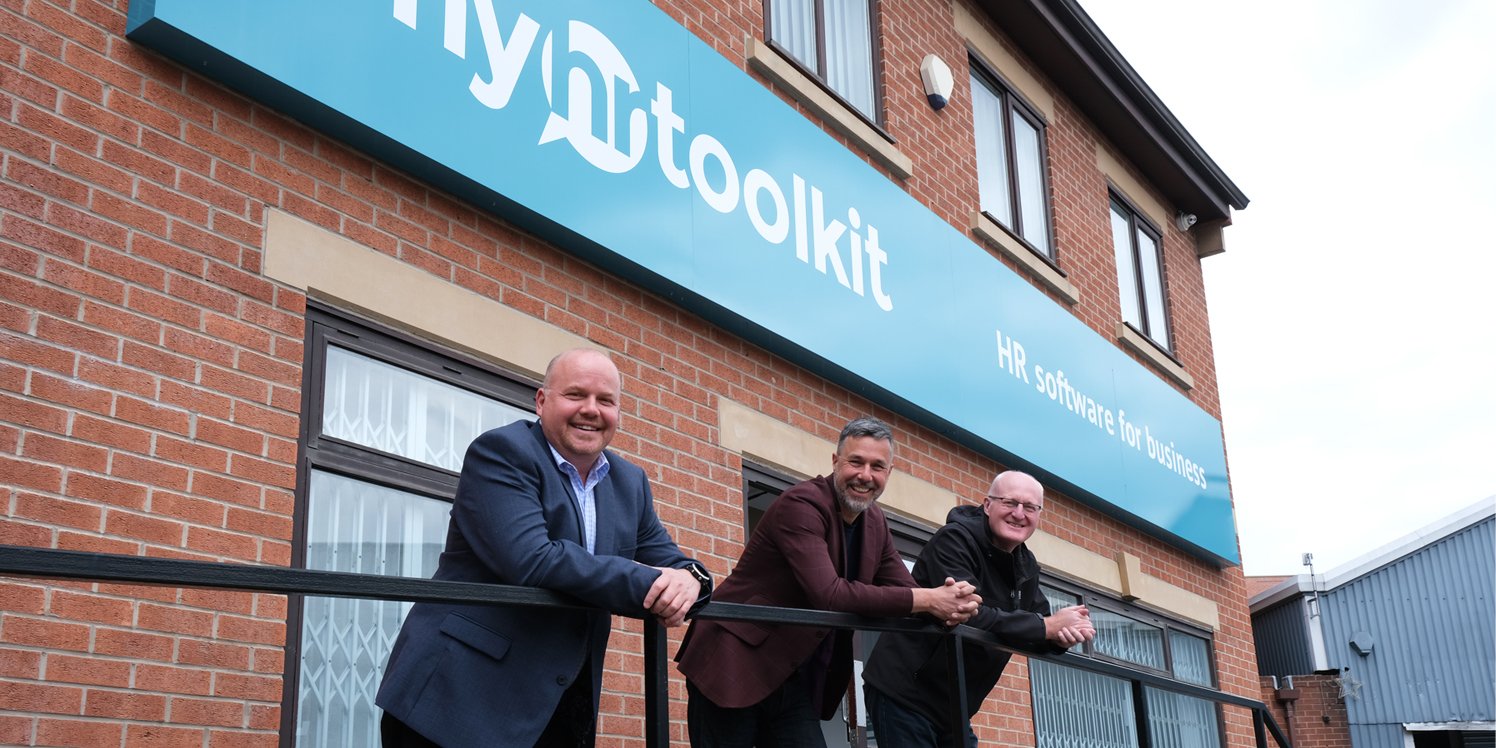
Neil Laycock, COO of Agilio Group with myhrtoolkit Founder, Jon Curtis and Managing Director, Bob Teasdale outside the myhrtoolkit offices in Sheffield
CB: I wanted to hear your thoughts on how you see myhrtoolkit and Agilio working alongside each other and what’s in store for us?
"I mean we’ve never done this before – and probably won’t do it again now! To be acquired in this way, we were very happy about it, it’s been very exciting. A lot of what we’re doing in the short-term to medium-term is obviously to continue to keep our existing customers happy, keep delighting them, keep providing innovative software. In that respect, the service remains the same, we’re in the same place with the same people and the same phone number.
"Longer-term, what is quite exciting is that Agilio, their main market sector is around dental and medical training and compliance, but they have quite a few modules in their software armoury that I’m already looking at and thinking – yeah, our customers would like those, how do we go about bringing them to bear?
"Agilio are very keen for us to do that, provide more to our customers and provide it for new customers as well. That’s probably the direction of travel, it’ll just get more and better."
Learn more: Agilio acquires myhrtoolkit ltd
Final question: what would you best piece of business advice be?
"I don’t know if it’s my best, but I think something I learned early on… I spent many years cutting my teeth in a recruitment business. In recruitment, it’s very polarised. You’re either surfing on top of the wave and things are going great and you’re the master of the universe – well, your desk at any rate – or the wave’s dumping on you and you’re eating sand.
"Something I learned that has stood me in good stead is that wherever you are – whether you’re on top of the wave or under it – is to keep working hard and try not to let things push you back or set you back. A lot of it is about attitude – yeah, hard work’s important, but it’s easy to work hard when things are going your way. What’s perhaps moreso is to dig in, as they say suck it up, and keep going even when times feel tough."
Read more myhrtoolkit news
Agilio Software acquires myhrtoolkit adding depth to their iTeam HR product portfolio


 Holiday Planner
Holiday Planner Absence Management
Absence Management Performance Management
Performance Management Staff Management
Staff Management Document Management
Document Management Reporting
Reporting Health and Safety Management
Health and Safety Management Task Management
Task Management Security Centre
Security Centre Self Service
Self Service Mobile
Mobile